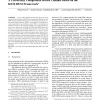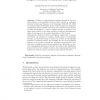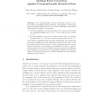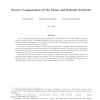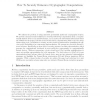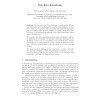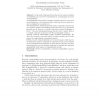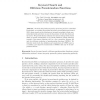TCC
2005
Springer
15 years 7 months ago
2005
Springer
120
click to vote
TCC
2005
Springer
15 years 7 months ago
2005
Springer
Abstract. We prove a computational soundness theorem for the symbolic analysis of cryptographic protocols which extends an analogous theorem of Abadi and Rogaway (J. of Cryptology ...
115
click to vote
TCC
2005
Springer
15 years 7 months ago
2005
Springer
For computationally bounded adversarial models of error, we construct appealingly simple, efficient, cryptographic encoding and unique decoding schemes whose error-correction capab...
130
Voted
TCC
2005
Springer
15 years 7 months ago
2005
Springer
The standard class of adversaries considered in cryptography is that of strict polynomial-time probabilistic machines. However, expected polynomial-time machines are often also co...
134
click to vote
TCC
2005
Springer
15 years 7 months ago
2005
Springer
We address the problem of using untrusted (potentially malicious) cryptographic helpers. We provide a formal security definition for securely outsourcing computations from a comp...
104
click to vote
TCC
2005
Springer
15 years 7 months ago
2005
Springer
Abstract. We introduce Fair Zero-Knowledge, a multi-verifier ZK system where every proof is guaranteed to be “zero-knowledge for all verifiers.” That is, if an honest verifi...
111
click to vote
TCC
2005
Springer
15 years 7 months ago
2005
Springer
In this work, relations between the security notions standard simulatability and universal simulatability for cryptographic protocols are investigated. A simulatability-based notio...
108
click to vote
TCC
2005
Springer
15 years 7 months ago
2005
Springer
We study the problem of privacy-preserving access to a database. Particularly, we consider the problem of privacy-preserving keyword search (KS), where records in the database are ...
117
click to vote
TCC
2005
Springer
15 years 7 months ago
2005
Springer
Russell and Wang [22] recently introduced an elegant, information-theoretic notion called entropic security of encryption: they required that the cipher text leak no predicate of ...
